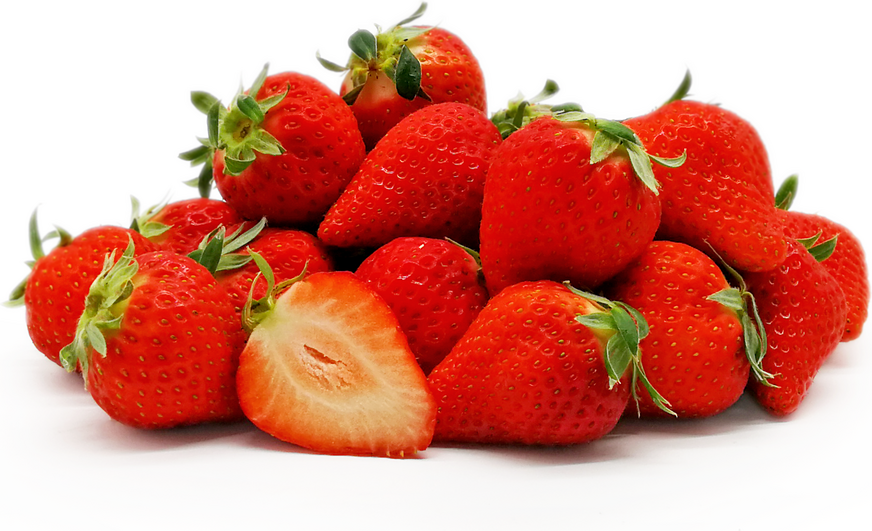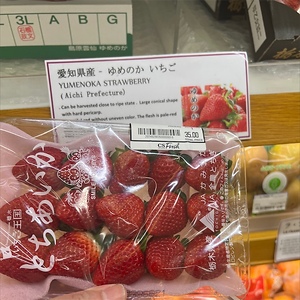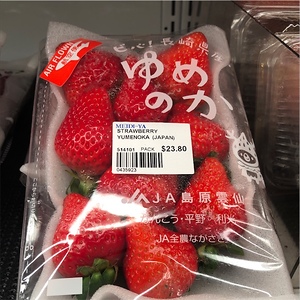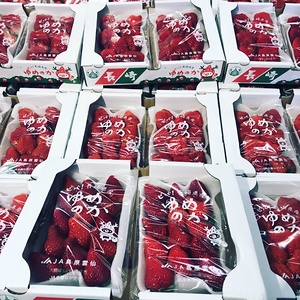


Yumenoka Strawberries
Estimated Inventory, ea : 0
Description/Taste
Yumenoka strawberries are a medium to large varietal, averaging 18 to 20 grams in weight, and have a uniformly conical, elongated appearance with broad, sloping shoulders tapering to a slender, pointed tip. The strawberries are topped with green, leafy caps with several flat lanceolate-shaped leaves and are covered in tiny, external yellow-brown seeds. The fruit's skin is bright red, glossy, taut, and smooth with a firmer nature, allowing the strawberries to be handled without rapid bruising. Underneath the surface, the pale red to orange flesh is generally solid in color through the core and has a firm, aqueous, dense, tender, and succulent consistency. Yumenoka strawberries release a sweet, fruity aroma and should feel heavy for their size when ripe. The variety has a high sugar content, ranging from 10 to 11 Brix, sometimes reaching 13 Brix, and is mixed with moderate acidity levels, creating a balanced, sweet, tart, and refreshing flavor.
Seasons/Availability
Yumenoka strawberries are available in the winter through early summer in Japan, with a peak season in February through April.
Current Facts
Yumenoka strawberries, botanically classified as Fragaria ananassa, are a modern Japanese variety belonging to the Rosaceae family. The strawberries were developed in the early 21st century and were selected as an improved cultivar for commercial production. Before Yumenoka strawberries were created, the Aichi Prefecture was known for producing Akihime and Tochiotime strawberries, but these varieties were challenging to cultivate due to their low yields and delicate nature. Yumenoka strawberries were developed to showcase improved flavors, high yields, a hardier nature, and disease resistance. Since their release, Yumenoka strawberries have become one of the leading commercial varieties within the Aichi Prefecture and were named for their sweet-tart, balanced flavor. Yumenoka roughly translates from Japanese to “dreamy aroma” or “a dream strawberry” and is a seasonal variety highly favored for fresh preparations.
Nutritional Value
Yumenoka strawberries are a source of vitamin C to strengthen the immune system, vitamin A to maintain healthy organ functioning, fiber to regulate the digestive tract, and copper to construct connective tissues. The strawberries also provide vitamin K to assist in faster wound healing, potassium to balance fluid levels within the body, vitamin E to protect the cells against the damage caused by free radicals, calcium to build strong bones and teeth, and other nutrients, including iron, magnesium, zinc, manganese, and phosphorus.
Applications
Yumenoka strawberries have a sweet-tart flavor suited for fresh and cooked preparations. The variety is popularly consumed straight out of hand, and it is recommended to bite directly into the flesh rather than slicing or cutting to experience the fruit's optimal texture and flavor. Yumenoka strawberries are commonly served with fresh cream, condensed milk, or chocolate as a snack or sweet treat. In Japan, the variety is sliced and served with whipped cream in delicate sandwiches, layered into parfaits, or added as a fresh decoration on cakes, tarts, and ice cream. Yumenoka strawberries can also be served on appetizer platters with cheeses and nuts, mixed into salads, used as a topping on pizza and sushi, blended into crepe batter, or simmered into jams, jellies, and purees. In dessert preparations, Yumenoka strawberries are wrapped into mochi, baked into doughnuts and cream puffs, or kneaded into a dough for strawberry dangos or sweet dumplings. Yumenoka strawberries pair well with fruits such as blueberries, kiwis, mangoes, and peaches, green tea, vanilla, caramel, dark chocolate, leafy greens, and herbs, including mint, basil, and cilantro. Whole, unwashed Yumenoka strawberries will keep up to one week when stored lightly covered or in a plastic bag in the refrigerator's crisper drawer. For the best quality and flavor, consume the variety within 2 to 3 days.
Ethnic/Cultural Info
In Nagasaki, Japan, the character Yume-Zukin Chan was created by the Japanese Agricultural Cooperative Federation to promote the sales of Yumenoka strawberries. Yume-Zukin Chan is a cartoon deer dressed in a strawberry costume. Deer are symbols of the Nagasaki region, and the branded strawberry mascot is often displayed on the packaging of the Yumenoka strawberry. Yume-Zukin Chan was first released on Strawberry Day in January, a famous annual strawberry-centric event. Over time, Yume-Zukin Chan has become a symbol of good luck and fortune in Nagasaki. It is customary to give fresh Yumenoka strawberries as gifts, and when the strawberries are wrapped in packaging with Yume-Zukin Chan, it is believed that the fruits will bring good luck to the receiver. Yumenoka strawberries are also viewed as lucky for their deam-like moniker. During difficult school exams, cakes with Yumenoka strawberries are known as “dream come true cakes” and are given to students as a symbol of good luck. Yumenoka strawberries are also gifted on Valentine’s Day and are combined into chocolates, known as “dream chocolates.”
Geography/History
Yumenoka strawberries are native to Japan and were developed at the Aichi Prefectural Agricultural Research Institute in the Aichi Prefecture. The variety was created from traditional cross-breeding techniques in 1999 and was bred from Kei 531 and Kurume 55 strawberries. Kei 531 strawberries are the male parent and are a hybrid variety of Nyoho, and Piestro strawberries, later crossed with Istro strawberries. Kurume 55 strawberries, the female parent variety, were selected for their high yields and created at the Kyushu Okinawa Agricultural Research Center. Yumenoka strawberries were chosen as a new potential cultivar in 2005 under the name Aichi No. 6 and were officially registered as a variety in 2007. Commercial production of the variety expanded from the Aichi Prefecture to the Nagasaki Prefecture in 2012, and today Yumenoka strawberries are cultivated in the Aichi, Nagasaki, Nara, and Saga Prefectures. Within the Aichi Prefecture, the strawberries are grown in Aisai city and Tsushima city within the Kaifu region. When in season, Yumenoka strawberries are offered directly from growers and are sold through select grocers, distributors, and markets in Japan.
Recipe Ideas
Recipes that include Yumenoka Strawberries. One
Podcast










